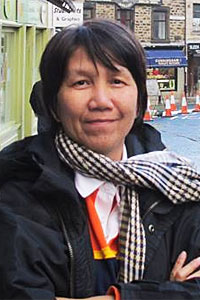When thinking about vicious cycles in Thai politics, most -- if not all -- people think about military coups and political interventions by the men in green which have occurred twice since 2006. Fledgling attempts at reviving democracy are set back when the army stages another coup.
But these can unfold even in relatively "ordinary" democratic times. In fact, another vicious cycle has emerged right before our eyes since the March 24 election. Such cycles, which obstruct political development substantially, happen time and again.
It's a cycle in which politicians fiercely engage in power bargaining and horse trading without shame. It is also a major reason why citizens are fed up with politics.
The bargaining only intensified after a joint meeting of parliament voted for Gen Prayut Chan-o-cha to return as prime minister.
Since then, all parties with an eye on joining the coalition government have scrambled for cabinet seats. Most of them have eyed the so-called "Grade A" ministries with enormous budgets, and have tried hard to justify themselves for such top picks.
All claim that as they are elected by the people, they are entitled to cabinet positions and, as we have seen, some have resorted to dirty tricks, including spreading rumours about abandoning pledges to join the Prayut-led coalition, which is vulnerable giving its thin majority.
Their conduct casts these politicians in a bad light, and dim people's hopes about what to expect under the new, post-election era of politics.
While members of the public look forward to a new government, such horse-trading steals time from the new coalition which it could spend mapping out policy issues for the crucial policy statement to parliament. The delay in the government's formation gives the impression that tough bargaining may be still going on.
According to Thai political culture, positions in top ministries normally go to party leaders and secretary-generals regardless of their calibre.
As we are tired of the old political model, a new political culture is emerging.
In one recent episode, some party leaders, whose families run business empires, have had to reject top ministerial positions and pass them over to their secretary-generals for a while as they settle for junior portfolios, citing "concerns over conflict of interest" if they are to seek concessions for state projects.
But will there be any difference as we all know these politicians are as close as brothers. It will just be interest-sharing in the same old political network.
It's also common practice for parties to award top positions to party financiers who, with their deep pockets, have helped them at the polls.
Yet alarming concerns about some financiers with poor images and bad records have prompted some of those parties to find replacements, mostly with none other than members of their own family as political proxies.
Even the country's oldest political party, under a new leader, has tried handing out all the cabinet cake to cronies. It wasn't until members challenged the move that the leader had to change his plan.
These power games within parties have even been seen in the leading coalition party, Palang Pracharath (PPRP).
After managing to persuade the Democrat and Bhumjaithai parties to join the governing coalition, the PPRP, claiming that some of its members were disappointed at having lost portfolios to coalition parties, tried to renege on proposed seat allocations to its partners-to-be. It then pulled back some top cabinet posts it had promised them, only to face fierce resistance.
There are also some "ad hoc" parties that came into existence because of a peculiar condition under the 2017 charter. These parties also want the leading party to reward them for their support.
Seat bargaining is also based on the region that politicians hail from. Some say they are entitled to a seat because they represent millions of voters, or they will not be able to cater to their needs.
Such behaviour is known in Thai as koh kala, the act of striking a coconut shell by a beggar to draw attention. For politicians, it is designed to enhance their value.
They know that a government with a thin majority needs their support and may have no choice but to accept their demands.
That brings about the need for a key figure who acts as a "mobile ATM", handing out cash to those rowdy politicians in exchange for their support, especially when the government wants their votes for crucial bills.
During Gen Prem Tinsulanonda's administration, veteran leader Banharn Silpa-archa played such role.
Gen Prayut has some very harsh lessons waiting in store for him. Running the new government will be very different to what he has experienced over the past five years.
He will need every bit of support from the Senate, while dealing with old faces, many of whom are amoral, or freshies without any political experience.
It will also be tough for him with regard to the opposition camp, who could turn difficult when it comes to seeking their support for crucial bills.
Like it or not, here we are trapped in a new round of a vicious political cycle.
Nauvarat Suksamran is assistant news editor, Bangkok Post.
